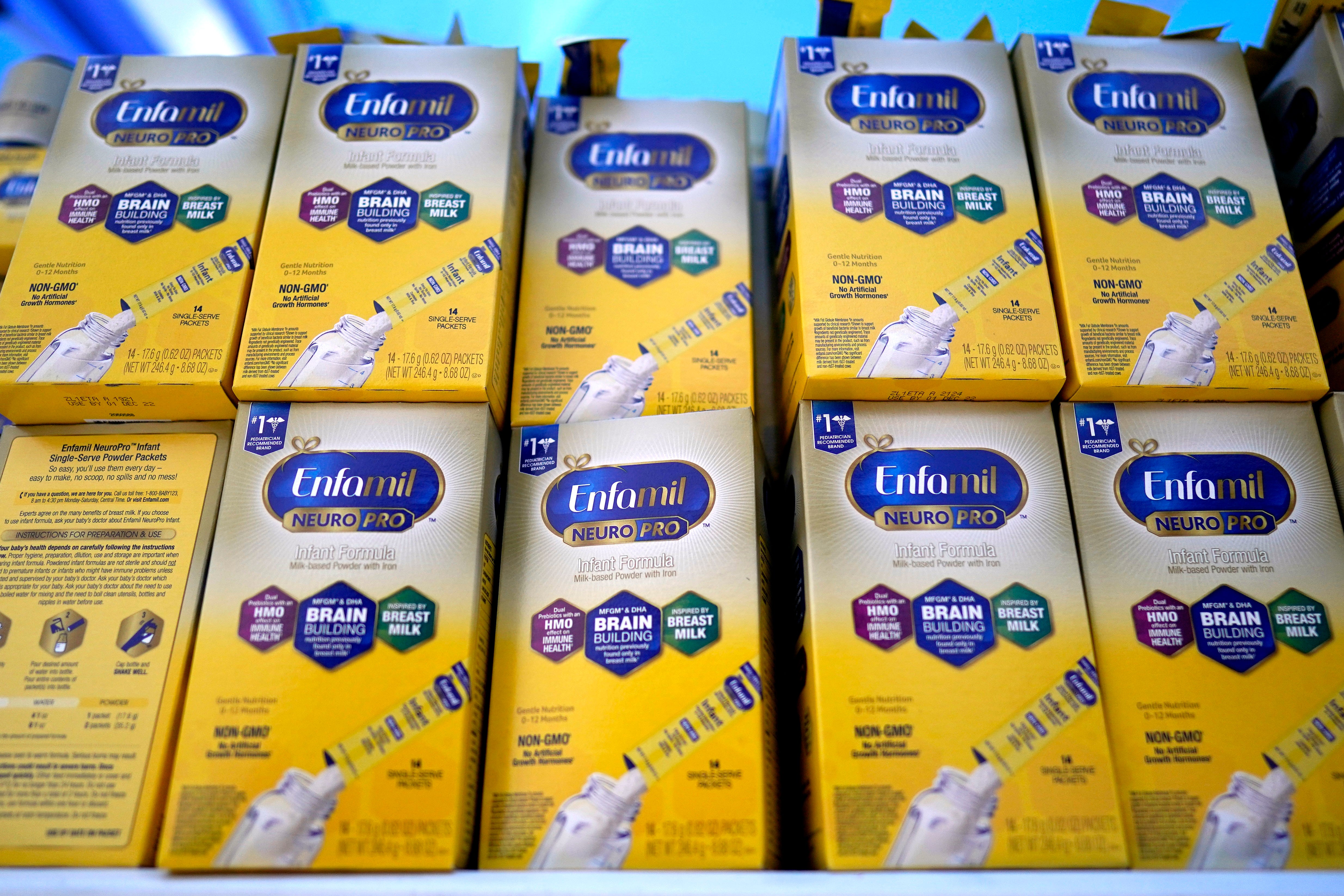The Independent's journalism is supported by our readers. When you purchase through links on our site, we may earn commission.
Why is there a baby formula shortage in the US?
With children hospitalised and parents paying up to $100 for a can, the president has now invoked a wartime measure to try to ensure there is enough formula to feed America’s babies

Across the US, parents have been left desperately scrambling to try to feed their infants as the nation’s baby formula shortage soars to crisis levels.
A staggering 43 per cent of the top-selling baby formula were out of stock across US retailers in the week ending 8 May, according to analysis from Datasembly.
The dire situation marks a dramatic surge in out-of-stock levels in a single month, jumping from 30 percent at the start fo April to 40 percent by the end of the month.
This time last year, Datasembly found that out-of-stock levels fluctuated between just 2 and 8 per cent.
With families struggling to find enough formula to feed their children, the president invoked a wartime measure to fast-track the supply chain and products are being flown in from overseas by the Pentagon to try to keep shelves stocked.
Here’s everything we know about the US baby formula shortage:
Why is there a shortage?
At the centre of the nationwide baby formula shortage is the shutdown of Abbott Nutrition's plant in Sturgis, Michigan, which is the largest manufacturer of baby formula in the US.
All production has been halted at the facility for the last three months after Abbott announced it was issuing a voluntary recall in February following the deaths of two babies.
Two babies died and at least two others were hospitalised with bacterial infections after consuming formula that was produced in the factory, sparking federal officials to launch an investigation.
The recall included various lots of three powdered infant formulas from the plant.
The company halted production while Food and Drug Administration inspectors conducted a six-week investigation of the plant.
But it’s not certain the bacteria came from the plant; strains found at the plant didn’t match the two available samples from the babies.
A preliminary report released in March found traces of a bacteria — cronobacter— on several surfaces throughout the plant, though not in areas used to make the powder.
Plant records showed Abbott had detected the bacteria eight times in its products or facility since 2019.
Inspectors also flagged other problems, including standing water on the floor and employees who didn’t properly sanitize their hands.
The FDA hasn’t released a final ruling on the problems at the plant and whether they are linked to the infections.
“There are many factors involved in this ongoing investigation and we’re just not in a position to make any definitive statement,” FDA Commissioner Robert Califf said Monday.
Abbot says the lack of a strain match indicates “there is no evidence to link our formulas to these infant illnesses.”
What is cronobacter?
The bacteria occurs naturally in soil, water and other parts of the environment. Infections with cronobacter are rare but can be fatal in babies.
Almost all previous outbreaks in the US have been linked to powdered baby formulas, which don’t undergo the same high temperatures used to kill germs in many other foods.
Sometimes the bacteria can get into powdered formula after its opened at home if a dirty scoop is used or it is mixed with water that’s contaminated with the germ, according to the Centers for Disease Control and Prevention.
Cronobacter typically causes fever in infants and can sometimes lead to dangerous blood infections or swelling of the brain.
The four reported illnesses were in Minnesota, Ohio and Texas between September and January.
What toll has this taken on babies and their parents?
With the shortage reaching crisis levels, infants with certain nutritional needs are being hospitalised and parents are being forced to shell out over $100 for a single can.
In Memphis, a doctor said that he had treated two children who had hospitalised as a direct result of the formula shortage.
Dr Mark Corkins, a paediatric gastroenterologist at Le Bonheur Children’s Hospital, told Action News that both children have intestinal conditions which require them to be fed a particular kind of formula.
They both reacted badly when their parents were unable find the required formula and are now being treated with IV fluid and extra nutrition at the hospital, he said.
While panicked parents clamour to find enough to feed their infants and store shelves are increasingly bare, many are also coming up against huge price hikes.
One Texan mother Ashley Hernandez told the New York Times last week that she turned online and found a single can of the baby formula her two daughters have on eBay for $120.
In the end, she found a seller offering 10 cans for $40 each and, despite the high price, quickly bought it.
However, she said the supply will only last them around five or six weeks and then she will be back to square one.
How have retailers responded?
Major retailers are responding by limiting the number of products that customers can buy in an effort to try to ensure that there is enough to go around.
Last week, both CVS and Walgreens announced that they are limiting customers to three toddler and infant formulas per purchase across all US stores.
Walgreens Boots Alliance spokesman Steve Cohen said in a statement that the move was necessary.
“Due to increased demand and various supplier challenges, infant and toddler formulas are seeing constraint across the country,” he said.
Target also limited purchases to up to four items at a time on its online store.
What is the government doing?
On Wednesday, President Joe Biden invoked Defense Production Act to ramp up production of baby formula in the US.
The Korean War-era law allows the president to require business to give contracts needed for national defence priority over others to help increase production and speed up supply chains.
The White House said that the president is “requiring suppliers to direct needed resources to infant formula manufacturers before any other customer who may have ordered that good”.
Mr Biden has also launched “Operation Fly Formula”, an operation to speed up the delivery of baby formula into the US from overseas.
As part of the operation, Department of Health and Human Services Secretary Xavier Becerra and Agriculture Secretary Tom Vilsack have been tasked to work with the Department of Defense on using aircraft to accelerate the delivery of products.
The decision to invoke the Defense Production Act came just one day after House Democrats introduced a $28bn emergency spending bill to help the FDA restore supplies of formula in as safe a manner as possible.
Last week, the Biden administration urged states to relax rules that restrict the sizes of containers that manufacturers can produce.
However, the US government has come under fire from desperate parents who say it has been too slow to act.
First Lady Jill Biden was slammed by some parents this week when she appeared in a video speaking about the issue insisting that the administration is “working around the clock” and that parents should consult their paediatrician for advice on alternatives.
Should the FDA have acted sooner?
The FDA is facing intense scrutiny about what steps it took — and didn’t — in the months before the recall.
FDA inspectors visited the factory in late September for a routine inspection, around the time that the first bacterial infection was reported in Minnesota.
Although inspectors uncovered several violations— including standing water and unsanitary conditions — they didn’t find any bacteria and let the plant stay open. It’s unclear if inspectors were even aware of the first reported illness.
After three more cases were reported, the FDA returned to the plant in January and detected the bacteria.
The FDA mainly focuses on assuring the safety of the food supply, with extra regulations and standards on foods for babies and children. But former FDA officials say the agency is supposed to consider potential shortages that result from shutting down plants.
In previous cases, the FDA has worked with companies to shift production to other facilities or find alternative supplies.
The FDA is doing that now under a new policy that eases imports of baby formula from foreign manufacturers. But both the agency and the White House are facing questions on why that step wasn’t taken sooner.
“We always believe we can do better in terms of the time frame,” Califf said.
Rep. Rosa DeLauro, D-Conn., reported last month that a whistleblower had contacted the FDA in October with allegations about unsafe conditions and practices at the plant, including falsifying plant records and failing to properly test formula for contamination. She said the FDA did not interview the whistleblower until late December. Califf is scheduled to answer questions from DeLauro and other lawmakers on Thursday.
What happens now?
Both the FDA and Abbott say they are working as quickly as possible to restart manufacturing at the plant.
But FDA officials say the onus is on Abbott to demonstrate its Michigan plant meets rigorous safety standards.
Former FDA officials say fixing the type of problems uncovered at Abbott’s plant takes time, and infant formula facilities receive more scrutiny than other food types. Companies need to exhaustively clean the facility and equipment, retrain staff, repeatedly test and document that there is no contamination.
Even after the facility opens, Abbott says it will take eight-to-ten weeks before new products start shipping to stores. The company continues to produce baby formula at its other plants in the U.S. and overseas.



Bookmark popover
Removed from bookmarks